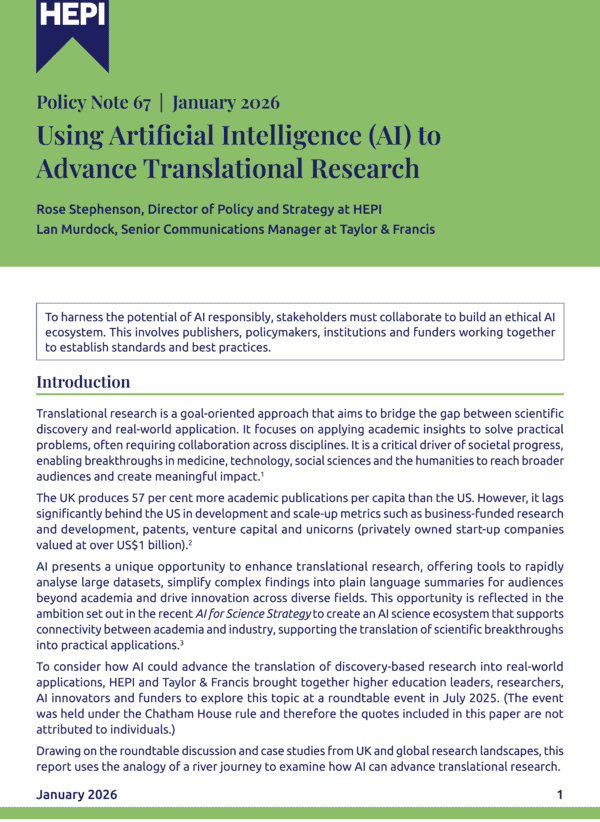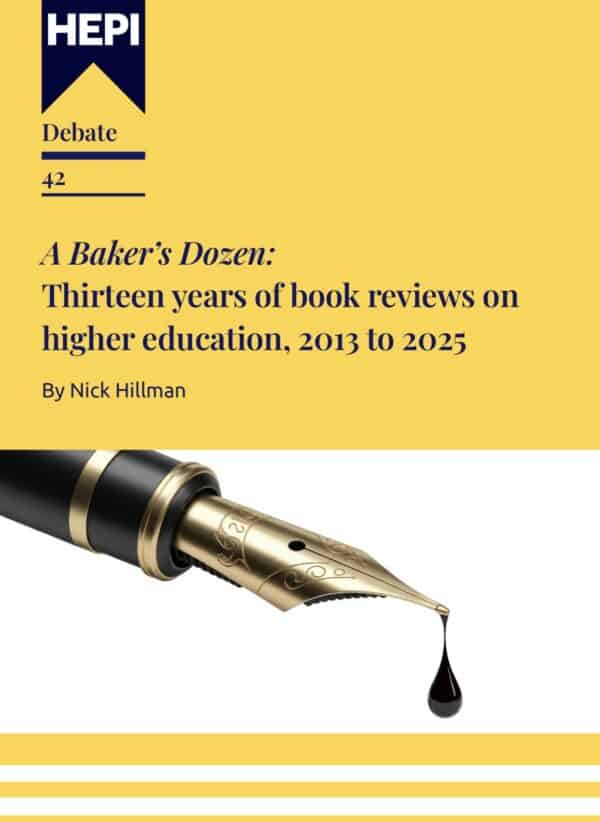The proposed international student levy could be the tipping point for a fragile sector
Professor Duncan Ivison is President and Vice-Chancellor of the University of Manchester.
Almost one year into the Labour government’s term, its vision for higher education is emerging. One exciting aspect of it is the role they see universities playing in helping to drive their agenda for inclusive growth. The recently announced R&D funding commitments, including regional ‘innovation clusters’, and the Industrial Strategy, all point to the role that higher education will play in driving innovation through world-class research and producing the highly skilled graduates our life sciences, technology, defence, and creative industry sectors – among others – will require. This is good news for the sector.
Baroness Smith, Minister for Skills, and Lord Vallance, Minister for Science, have made clear that they see the core principles that will shape the UK’s higher education sector over the next five years. This includes contributing to economic growth, conducting the highest quality curiosity-driven research, helping build national capabilities in key sectors, contributing to the economic and social well-being of the regions in which we’re based, and being a global force for UK soft power through international collaborations.
This is a compelling vision and one that – at least for the University of Manchester – we are keen to support, including through our forthcoming Manchester 2035 strategy.
But in politics, vision quickly runs up against political reality, and we can also see now some of the challenges the sector will face, not least in relation to immigration and the difficult fiscal situation the government faces. The recent Immigration White Paper makes that clear.
One of the more contentious aspects of the White Paper – in addition to reducing the graduate visa route from 24 months to 18 – is the proposal for a 6% levy on international student fees.
Of course, for those of us familiar with Australian higher education policy, it is, as Yogi Bera once said, déjà vu all over again. The Australian government proposed a 2% levy on international fee income in 2023, but it was never implemented. The main purpose of that levy was to redistribute fee income from the larger, research-intensive metropolitan universities to those (mainly in the regions) who struggled to attract international students. It stalled in the Australian parliament after fierce criticism from some parts of the sector, as well as the government deciding to pursue its aims through other means.
In the UK, on the other hand, the levy seems designed to do two things. First, to generate additional revenue for the Department of Education in a very difficult fiscal environment. And second, to make manifest the contribution that international students make to the UK.
There are several things wrong with this approach if indeed these are the main justifications for it. But I recognise it’s something currently being explored, rather than already decided, and so I offer my thoughts here as part of the consultations now underway.
First, it’s striking that for a government seeking to position itself as a champion of global free trade and economic growth, they are proposing what is essentially a tax on one of the UK’s most successful export industries (worth ~£22 billion a year from higher education alone).
Second, the fact that the government doesn’t feel the public understands the contribution that international students make to the UK is deeply concerning. The short answer is that they make a massive contribution: in fact, their financial contribution and talent has been crucial not only in helping the UK maintain its global standing as a higher education powerhouse, but also to the regional and local economies in which universities are based.
There are other more specific problems with the levy too, at least for a university like mine.
For one thing, a levy assumes universities can simply pass on the additional cost to our students. But this neglects the fact that we are operating in a highly competitive international market, and a significant price increase will make us less attractive to some of the fastest-growing parts of it. Moreover, many international students might not appreciate that they are now being asked to cross-subsidise other parts of the UK’s education system, in addition to the significant contribution they are already making. One perverse consequence of a 6% increase in fees might be that we end up abandoning our efforts to diversify the countries from which we recruit and focus only on those who can afford higher fees. This will only deepen the risk that successive governments have been keen for us to mitigate.
Moreover, at Manchester at least, we have already factored in increases to our international fees to account for rising costs over the next five years. Adding 6% on top of that would be unworkable. So, we would either have to absorb most, if not all, of the levy (plus inflation), or increase our fees substantially and lose market share. Assuming that we would see very little of the levy come back to us – the history of hypothecated funding is not encouraging in this regard – this would be a major financial blow. It would also, as a result, likely generate much less income than the Department hopes. For a sector already teetering on the edge of fiscal implosion, this could be the tipping point. To put it into context: for the University of Manchester, a 6% levy would mean a potential loss of ~£43M of revenue p.a by 2029/30, wiping out the slim margin we have for reinvesting in our teaching and research. The levy does nothing to address the structural challenges facing the higher education sector. In fact, it is likely to make things worse.
But it would also undermine our ability to do the very things the government wants us to do more of. Already, international student fees help us bridge the financial gap between what we receive to teach all our students and what it actually costs, as well as the gap between the full costs of research and what funding councils and charities provide. This is under threat if we get our higher education policy settings wrong. And let’s be clear: it would hurt local students and local economies most. Almost half our students remain in Manchester after they graduate, contributing hugely to our city and region.
We are keen to contribute to the government’s vision for higher education. For example, we are spending ~£21M p.a. on helping disadvantaged students with their cost of living and studies. And from this year, we will be investing more than ever before in accelerating the commercialisation of our research and generating more student and staff start-ups, scale-ups and job creation for Greater Manchester and the country.
I understand the challenges the government faces on immigration and funding higher education. There should be no tolerance of shonky providers serving as a front for migration workarounds. And universities need to prove they are operating as efficiently as possible and collaborating in new and transformative ways – as I’ve argued elsewhere and as we’re doing with Liverpool and Cambridge.
An alternative approach to a levy would be to develop specific compacts with clusters of universities based on delivering against the government’s core priorities for HE in concrete ways – building on the new ‘innovation clusters’ in the recent R&D announcement. We’re already doing this in Greater Manchester, given the excellent collaborative culture that exists between the universities, further education colleges, and the Combined Authority. It’s a model we could scale nationally. I look forward to the discussions to come in the weeks ahead.







Comments
Charrua says:
As Mel Brooks said: “It’s nice to be asking.” But the UK should begin taking more responsibility for the universities it wants, rather than continuing to operate as though it still held the privileges of a colonial power.
Universities today rely heavily on high fees from international students and the undervaluation of international scholars. Now, there’s talk of raising those fees further to subsidise education for British nationals and research initiatives.
This raises uncomfortable questions about fairness. When the conversation turns to immigrants, we often hear that they should pay for the benefits they receive. But when it comes to supporting British students and institutions, the financial burden seems to shift—again—onto international shoulders. There’s an inconsistency here that’s hard to ignore.
And international students are noticing. Just look at recent enrollment trends.
We’re well into the 21st century. The days of empire are long over. Perhaps it’s time the UK reconsidered how it funds its educational ambitions—and started paying for the higher education system it chooses to sustain. After all, in the end, you get what you pay for.
Reply
Michy says:
I think the UK government should understand that this age and era presents new realities that demand a radical shift in the perception. Young people from developing countries are seriously reconsidering UK as a destination for higher education. In fact, over 75% of African young professionals are no longer seeing UK as a place to explore for studies. They are looking at countries that offer affordable programmes, good job prospects, easier career transition system and friendly immigration policies. Some countries are offering all these as a combo package to students in Africa and Asia. The truth us that the UK is speedily losing its reputation as a study destination especially among you g people in developing nations. I think tover-inflated colonial ego still clouds the mindsets of the UK government policy on engaging prospects from developing nations.
Reply
Kunwei says:
From an international student’s perspective, the UK has always been an attractive destination for higher education. However, the reality we face is that we are expected to pay significantly higher tuition fees, have access to fewer scholarships and funding opportunities, especially at the PhD level, and are often excluded from internships which are primarily reserved for local students. When trying to join exchange or networking activities organised by universities, we frequently discover they are only open to domestic residents.
For many Chinese students in particular, it’s difficult to engage meaningfully in local cultural or artistic activities beyond being consumers — which clearly reflects an unsustainable development model in the long run.
With the rising exchange rates and ongoing inflation, coupled with the UK government’s proposal to further increase costs for international students, the country is gradually losing its once-dominant competitive edge. If this trend continues and the concerns of international students continue to be overlooked, it’s hard to say who will suffer more in the end.
After all, there are other destinations — such as Australia, Japan, Singapore, and Hong Kong — that are actively becoming more welcoming to international students.
Like many others, I came here to learn cutting-edge knowledge, to be part of a global research community, and to do work that could truly change the world. But it is incredibly disheartening to be repeatedly asked to pay more, while being shut out from PhD opportunities and companies simply because of our international status.
Reply
Adam says:
The back door to immigration can be fixed very easily.
1. You can only work in your chosen field of study after leaving university on your post study work visa.
2. If you are unable to find work within 6 months then you must leave the country.
Far too many “students” are here working for Uber, far too many are passing courses they absolutely have no right passing, there are several without basic English skills.
I’ve interviewed too many who don’t know anything about the subject they supposedly have a masters degree in.
The reality in the real world outside of education is that we don’t want to hire what universities are producing through their masters programs as we don’t trust them. We bin any applications from international students these days as we’ve been burned too many times by lying and cheating.
Stop propping up failing universities and let them fail, they’re not producing talented products that the real world want, I’m sure the employees of these poor excuses for universities will scream bloody murder but tough!
Reply
Add comment